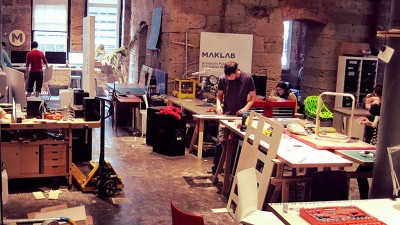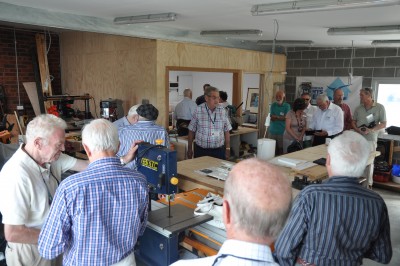Over the past three months, I’ve been doing site visits to maker and hacker spaces across Scotland. For the first phase of In the Making, we’re surveying existing facilities in the UK to identify what opportunities and challenges they might present to disabled users.
Two Types of Space

It quickly became clear that makerspaces fell into two categories. There are large and (reasonably) well-resourced commercial spaces that act as service providers, aiming to make digital fabrication tools available to a wide range of people. Then there are smaller, less well-resourced community spaces started by groups of enthusiasts who primarily want a space to meet like-minded makers. But there’s also a gradient between the two categories, and it’s clear that some of the smaller spaces have the ambitions to grow and reach a wider audience.
What we haven’t found is many examples of makerspaces being used by disabled people, which was perhaps to be expected. There are some examples of DIY assistive technologies being built, most notably in the form of 3D printed prosthetics, but we’re interested in what usage might exist beyond assistive technologies. What we did find is a lot of examples of spaces large and small reaching out to wider audiences, including people with disabilities, through public events, mobile facilities and partnerships with various organisations. But resourcing these outreach activities was a struggle, especially for the smaller spaces.
I was particularly drawn to the therapeutic aspects of craft and making. This was evident in collaborations between makerspaces, arts organisations and disabilities charities, where the act of making is found to be much more important than what is made. But it was also evident in the community spirit of the smaller makerspaces, where the value of having the space and collocating otherwise solitary activities far outstripped the value of the activities themselves. Happily, my final visit underlined this spectacularly.
Westhill Men’s Shed

Westhill Men’s Shed is part of an international network of sheds where men, mostly retired, come to work on projects in the workshop, but they also come to chat, play cards, drink tea, take cookery lessons and use ICT facilities. Underpinning all of this is a focus on mental health and emotional wellbeing—although this is not foregrounded due to the stigmas attached, particularly in the eyes of older men.
When I visited on a Friday lunchtime, the Shed was far busier than any makerspace I visited with somewhere between 12 and 20 members present. The wellbeing outcomes that they have seen are astounding. An analysis by the Scottish Men’s Shed Association has shown a tenfold return on investment, as members are happier and healthier, requiring and finding themselves requiring less medication. Individual stories are no less remarkable—men who have retired or lost their wives, given a lifeline and a new sense of purpose. Just as impressively, the Shed has become self-sufficient by selling the things they make and upcycling donated tools.
Beyond the amazing qualities of the Men’s Shed, what struck me most was the similarity to many of the makerspaces that I’d visited, particularly the smaller ones. The tools—and the attendees—might be a bit more old-school, but in both cases, the existence of the workshop itself was incidental—what was important was that it brought people together. I thought it was interesting that by targeting a particular community with shared experiences and issues, rather than a particular set of fabrication technologies, Men’s Sheds had been able to propagate across Scotland much faster than makerspaces. I think makerspaces could probably learn a lot from what they’ve achieved.
Next Up
With the first stage of the project complete, we’ll be applying what we’ve learned to a series of workshops with disabled people in Salford through the second half of the year. A launch event for the programme will be hosted in the BBC’s MediaCityUK building at the end of July.
Leave a Reply